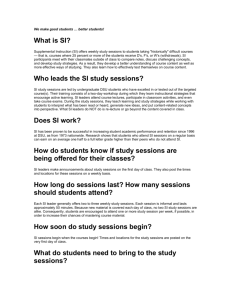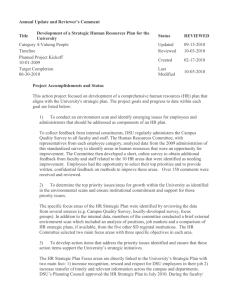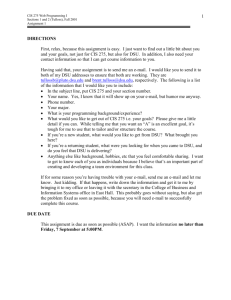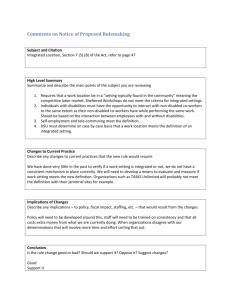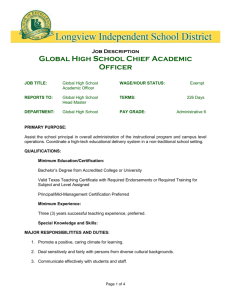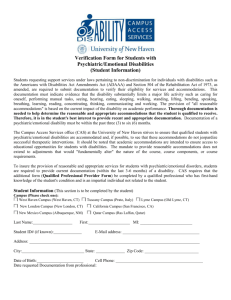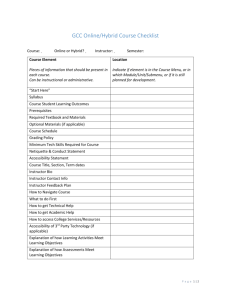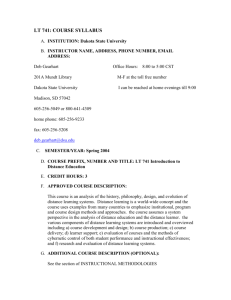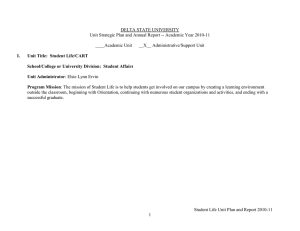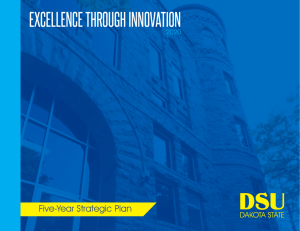ASC 100 Freshman Seminar - Dickinson State University
advertisement
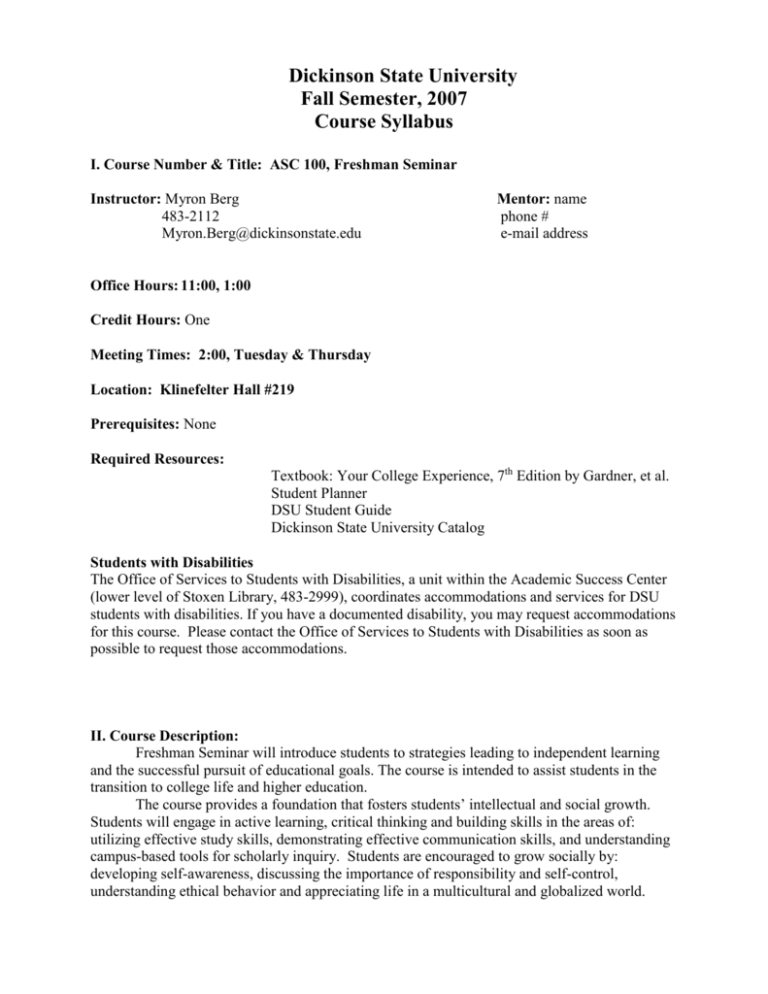
Dickinson State University Fall Semester, 2007 Course Syllabus I. Course Number & Title: ASC 100, Freshman Seminar Instructor: Myron Berg 483-2112 Myron.Berg@dickinsonstate.edu Mentor: name phone # e-mail address Office Hours: 11:00, 1:00 Credit Hours: One Meeting Times: 2:00, Tuesday & Thursday Location: Klinefelter Hall #219 Prerequisites: None Required Resources: Textbook: Your College Experience, 7th Edition by Gardner, et al. Student Planner DSU Student Guide Dickinson State University Catalog Students with Disabilities The Office of Services to Students with Disabilities, a unit within the Academic Success Center (lower level of Stoxen Library, 483-2999), coordinates accommodations and services for DSU students with disabilities. If you have a documented disability, you may request accommodations for this course. Please contact the Office of Services to Students with Disabilities as soon as possible to request those accommodations. II. Course Description: Freshman Seminar will introduce students to strategies leading to independent learning and the successful pursuit of educational goals. The course is intended to assist students in the transition to college life and higher education. The course provides a foundation that fosters students’ intellectual and social growth. Students will engage in active learning, critical thinking and building skills in the areas of: utilizing effective study skills, demonstrating effective communication skills, and understanding campus-based tools for scholarly inquiry. Students are encouraged to grow socially by: developing self-awareness, discussing the importance of responsibility and self-control, understanding ethical behavior and appreciating life in a multicultural and globalized world. III. Student Learning Outcomes: A. Institutional Outcomes 1. Critical Thinking Students will demonstrate critical thinking in a variety of contexts for life long learning. 2. Communication and Technology Skills Students will demonstrate proficiency in communication skills in a variety of forms including the effective use of current technologies and other information resources. 3. Multicultural and Global Awareness Students will demonstrate knowledge of national and international multiculturalism and the importance of global citizenship. 4. Aesthetic Appreciation Students will demonstrate knowledge of the arts and humanities including participation in artistic activities. 5. Discipline Based Knowledge Students will demonstrate discipline-specific knowledge and career skills related to their field/s of study. 6. Health and Wellness Knowledge Students will demonstrate knowledge of the importance of health, wellness, and maintaining a healthy lifestyle. B. Course Student Learning Outcomes At the completion of this course, the student will demonstrate: 1. An awareness of self-learning preferences and an ability to apply effective study skills. 2. The ability to utilize critical thinking skills. 3. Knowledge of tools needed for scholarly inquiry and the ethics of scholarly inquiry. 4. Effective oral and written communication skills. 5. Self-awareness of one’s worldview and appreciation for the worldview of others. 6. Knowledge of the importance of self-control and responsibility for choices. 7. An understanding of ethical behavior and the obligations of citizenship in a community. 8. An appreciation and sensitivity for life in a complex, multicultural and globalized world. IV. Course Content: Topical List Introduction to course and classmates Course Requirements Orientation to the Academic Success Center/Library within first 3 weeks Transition/Academic Success Academic Integrity / DSU Student Guide Policy Campus Resources Introduction of Technology Applications within Campus Environment Technology presentations (Minimum of 1 presentation) Library instruction Campus involvement (10 Activities to be attended) Critical Thinking Learning Styles Textbook reading Study Skills Note taking Test Taking Strategies Writing Exercises (minimum of 7) 2 outlines 2 drafts 1 short revised paper, of 2-3 pages in length 2 personal reflective responses Academic Integrity (DSU Student Handbook) Time Management Goal Setting Advising: Catalog, Advising Folder, General Education Requirements, Registration & computerized registration processes Scholarship Applications Predictive Index (PI) & Application to Careers Measure of Academic Performance and Proficiency (General Education Assessment) College Student Inventory Report, & review results in a meeting with instructor Diversity Civic responsibility and global citizenship Alcohol and Drug Awareness Community Service Project (minimum of 1) Attendance at one-to-one mentor meeting (minimum of 1) Course Evaluations V. Teaching Strategies: A. Various campus and community speakers Written exercises, journals, essays Small group activities Tours of various campus facilities Lecture and discussion Library instruction Student presentations Role play E-mail communications Attendance at 10 campus events Community service work B. Research Basis: This course is based upon research and theories from the following resources: National Resource Center for the First Year Experience & Students In Transition National Center for Learning Communities, Evergreen State College, Washington VI. Assessment of Student Performance: A. Attendance & Participation: Attendance for this class is required: both attendance and class participation will be factored into grades. An important focus of learning in this course can only be derived from interactions during the class periods. It is an expectation that students will attend every class. B. Deadlines: Students are responsible for meeting all deadlines, unless prior arrangements have been made with the instructor. This includes instances when the student is absent from class. If a student is unexpectedly absent, he or she should contact the instructor as soon as possible to obtain information about assignments. C. Grading: Students in this course have opportunity to earn points for various assignments and class participation and attendance. These points will be calculated, with the total reflected in a percentage score. The final grade will be the total points earned by the student, divided by the total possible assigned points. This will be converted to a letter grade, utilizing the scale listed below. A student who demonstrates 59% and below mastery of the course content, will receive and F and will not pass the course. Grade Scale: Exemplary Acceptable Unacceptable A B C D F 90-100% 80-89% 70-79% 60-69% 59% and below D. Academic Honesty: Academic honesty and integrity are expected behaviors of students. Should any infractions occur, the ‘Code of Student Conduct’ in the DSU Student Guide would be followed. E. Failure to Pass the Course: This course is required of all DSU Freshmen, designed to help them with becoming a successful student. Should a student fail the course, they will be required to take a second course of ASC100 in the following semester of the same academic year. Library Instruction The dates and times for your class’s library instruction are: Tuesday and Thursday, Sept. 25 & 27 from 2:00 – 2:50 pm
